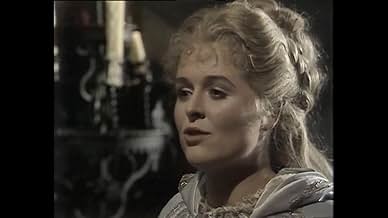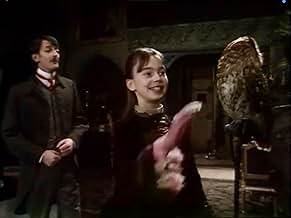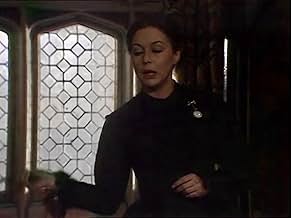Añade un argumento en tu idiomaChilling anthology series where membership to the secret society, The Club of the Damned, is granted through telling horror stories.Chilling anthology series where membership to the secret society, The Club of the Damned, is granted through telling horror stories.Chilling anthology series where membership to the secret society, The Club of the Damned, is granted through telling horror stories.
Explorar episodios
Argumento
Reseña destacada
Absolutely brilliant old BBC TV. This is the BBC during it's height, Golden Age Doctor Who, I Claudius, the M.R. James ghost stories, and it should be much more widely known. It features perhaps the creme de la creme of British acting talent at the time (Jeremy Brett, Billie Whitelaw, Robert Hardy, Denholm Elliott, Gordon Jackson - oh the cast is to die for!). Such was the talent avaliable at that time that each and every one of the main cast elevate the whole seriese far above what otherwise could have been fairly standard pop-horror, producing a real weight of gravitas and experience to the roles. The stories too however, are brilliant, I struggle really to pin point the best of the bunch, as I love them all. I have a certain soft spot for lurid, Victorianna-esque Gothic horror, I'm a sucker for it, so I'd probably like any of it. But "Night of the Marionettes" is especially good, due to the stark, amazing theatrical vivid quality to it with the genuinely unsettling marionette puppet show, shot on film as well, giving it a great, grimy, raw quality. I love also the two partner, "Countess Ilona" and "The Werewolf Reunion", largely because of the amazing cast surrounding it. A sordid collection of aristocratic monsters, Charles Kay playing a sneering snob who is little more than a grotesque sex pest, the other (played by Ian Hendry) an nihilistic war profiteer who booms his majestic voice across the hall espousing his beautiful misanthropic poetry, denouncing everything from religious faith to humanitarianism to peace, in between chuckling and stuffing his face perpetually with food. To the stuffy and uptight politician (Edward Hardwicke) a man so seemingly inhuman and robotic he feels more like an extension of the cold, glassy monocle he polishes repeatedly. Along with the foppish pianist played by Hugo Hoffman, they each get a gruesomely delicious fate, and it sparkles watching these actors, the peak of British acting talent bounce of one another, each unique in their personalities and personal philosophies, yet each acting like a kind of reflection of one another, all representatives of the casual culture of distain for humanity and disregard for women that marks this Prussian culture of aristocratic degeneracy and back stabbing grubby reactionarism.
Jeremy Brett too deserves special praise in "Mr. Nightingale". The story itself is very peculiar, yet he absolutely shines, doing what he would later master as Sherlock Holmes, every line shot out of his mouth like bullets from a Gatling gun, his teeth baring, his eyes bulging. He's just brilliant in how bizarre and malignant he can be.
The writing is also superb. It's very, very mid 70s BBC (anyone who watches Doctor Who or I, Claudius at the time will know exactly what I mean). Lots of harsh looking video, flare bulbs from bright lights, small sets like theatre, minimal camera movements, static shots of one or two actors. But I have to say It's brilliant for this series, the often highly loquacious dialogue being allowed to simply flow from the brilliant actors hired, allowing the poetic nature of it to drive the story. Atmosphere and tension and personal drama are at the forefront, not special effects (which, knowing the quality of some of that at the time, was probably wise).
It's a lost gem in my opinion, and should be far more widely known. I regularly rewatch it with a smile on my face, delighted by the weird cast of ghouls who come to recite their stories, diverse in their range and setting (and even period).
Jeremy Brett too deserves special praise in "Mr. Nightingale". The story itself is very peculiar, yet he absolutely shines, doing what he would later master as Sherlock Holmes, every line shot out of his mouth like bullets from a Gatling gun, his teeth baring, his eyes bulging. He's just brilliant in how bizarre and malignant he can be.
The writing is also superb. It's very, very mid 70s BBC (anyone who watches Doctor Who or I, Claudius at the time will know exactly what I mean). Lots of harsh looking video, flare bulbs from bright lights, small sets like theatre, minimal camera movements, static shots of one or two actors. But I have to say It's brilliant for this series, the often highly loquacious dialogue being allowed to simply flow from the brilliant actors hired, allowing the poetic nature of it to drive the story. Atmosphere and tension and personal drama are at the forefront, not special effects (which, knowing the quality of some of that at the time, was probably wise).
It's a lost gem in my opinion, and should be far more widely known. I regularly rewatch it with a smile on my face, delighted by the weird cast of ghouls who come to recite their stories, diverse in their range and setting (and even period).
- andrewroake
- 10 feb 2021
- Enlace permanente
Selecciones populares
Inicia sesión para calificar y añadir a tu lista para recibir recomendaciones personalizadas
- How many seasons does Supernatural have?Con tecnología de Alexa
Detalles
Contribuir a esta página
Sugerir un cambio o añadir el contenido que falta

Principal laguna de datos
By what name was Supernatural (1977) officially released in India in English?
Responde


































